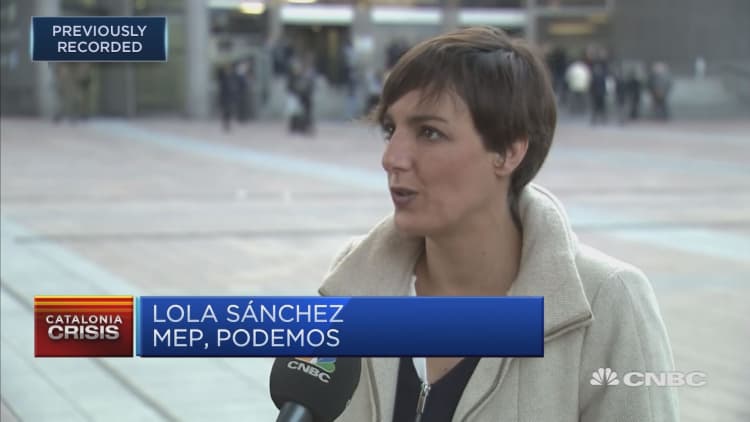
The Catalonia crisis is expected to reach new heights on Thursday with Spain looking likely to use its so-called "nuclear option" against the region, unless there is a last-minute change of heart from the pro-separatist leadership.
Catalonia's leader Carles Puigdemont has until 10 a.m. local time Thursday morning (9:00 a.m. London time) to withdraw the declaration of independence he made — albeit ambiguously — last week.
Puigdemont refused to clarify his government's intentions at an earlier deadline on Monday, at which point the Spanish government gave him one last chance to retract his equivocal response.
If there is no last-minute change of heart, Prime Minister Mariano Rajoy is likely to invoke Article 155 of the Spanish Constitution — its "nuclear option" which would allow Madrid to take control of the region, following approval from the Spanish Senate.
"All I ask of Mr. Puigdemont is that he acts with good sense," Rajoy told the Spanish parliament in Madrid on Wednesday.
As the latest and perhaps last deadline nears, it looks unlikely that Puigdemont will back down, however.
In Barcelona on Wednesday evening, he told members of his Catalan Democratic Party that he would press ahead with a more formal declaration of independence if Rajoy suspends Catalonia's political autonomy, Reuters reported citing sources within the Catalan government.
Article 155
If Article 155 is triggered Thursday its effects would not be felt for several days due to it requiring approval from the upper house of parliament, the Senate.
Rajoy would have to submit a list to the Upper House detailing the specific actions that the government is planning to take under Article 155. This list is also sent to a separate committee within the Senate that deals with autonomous communities, like Catalonia, before finally being debated by the Senate. A majority is then required to approve the proposals the Spanish government has suggested. Currently, Rajoy's People's Party has a majority in the Upper House meaning the proposals should pass.

Article 155 has never been invoked before so its effects — and how exactly the Spanish government would implement direct rule — are unknown.
Teresa Giménez Barbat, a founding member of Ciudadanos, a party allied with Rajoy's People's Party and against Catalan independence, told CNBC that Article 155 was the only option.
"The Catalan government has hijacked the institutions in Catalonia. And the solution is to trigger Article 155 of the Constitution and to organize new elections to have new representatives with a clear transparent election that change the scenario in Catalonia and we can then initiate dialogue with everybody."
Javi Lopez, member of the European Parliament and member of the Partit dels Socialistes de Catalunya (the PSC), the Socialist party in the region which backs the Rajoy government and does not support independence, told CNBC Thursday that snap elections were needed.
"If the Catalan government doesn't give this answer (on independence) then the Spanish government probably has to force, with Article 15, snap elections in Catalonia ... The political problem will be there after elections but the point is to force the elections and have new actors and to start dialogue to have constitutional reforms from Spain," he said.
Crisis a long-time coming
The current political crisis facing Catalonia and Spain has been long-coming. There has been a strong sense of separatism and regional identity in Catalonia, a wealthy region in the northeast of Spain, for decades. There have also been several unrecognized and unofficial referenda on independence in recent years.
The latest vote took place on October 1 in which 90 percent of 2.26 million regional voters opted for independence. Turnout was low at around 43 percent, however, and thousands of Catalans also took to the streets to protest against independence.
Puigdemont caused confusion following the vote by appearing to declare independence and then immediately suspend it, calling for dialogue with Spain, a request so far denied. His request for the European Union to mediate in the dispute has also fallen on deaf ears with the EU supporting the Rajoy government and saying it would not recognize an independent Catalonia.
Lola Sanchez, member of the European Parliament and founding member of Podemos, a party which advocates dialogue as the way to resolve the crisis, told CNBC that the European Union was wrong not to get involved and mediate between the two sides.
"We think that they should have a big voice on that but we're seeing that that the European Union has hidden behind the flag that this is a national issue," she told CNBC Thursday. "We think that Catalans and Spanish people are all European and Europe is supposed to be a promoter of human rights, democracy and dialogue and they're not doing that."
She said that neither a unilateral declaration of independence from Catalonia nor Article 155 was a solution to the crisis. "These things are not a solution, they will only deepen social unrest in Spain," she said.


